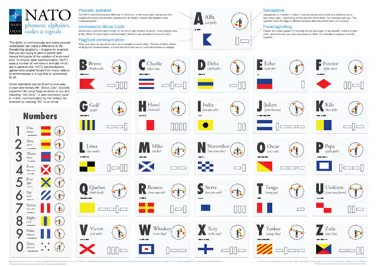Learn the NATO Phonetic Alphabet and Why It Works
Learn the NATO Phonetic Alphabet and Why It Works

As a species, humans have learned to develop various forms and categories of language and communication over the years, both out of necessity and out of a desire for more—more evolution, more interaction, more connection—whatever the case may be. The NATO phonetic alphabet is a form of language that was developed as a necessity, and it’s still quite useful in several different situations today.
NATO developed the phonetic alphabet to prevent miscommunications and spelling mistakes, especially when communication is taking place between people from different countries or with different accents and dialects. In 1956, it debuted as a tool for pilots to communicate effectively and within a few years, it was the standard, established universal phonetic alphabet to be used for all civilian, military, and amateur radio communication.
The NATO phonetic alphabet assigns a word to every letter, ensuring that the word begins with the letter in question—Alfa, for A, for one example.
Why standardize?
As with many things, there were years when every organization or military force used its own phonetic alphabet. This was effective enough for internal communication, but when it came to communicating with others, things got confusing, quickly. To reduce that confusion, the United Nations appointed the International Civil Aviation Organization (ICAO) to create an alphabet that was standardized and that included common sounds so that all nationalities could speak the alphabet with ease.
The idea was to ensure that all pilots could communicate, regardless of their native language or any accents that may be present. To do this, a notable linguistics professor from the University of Montreal was chosen for the job. Jean-Paul Vinay set to task and completed the new phonetic alphabet in 1951. It was not well-received, so it was modified and five years later, with just five changes to the original by Vinay, the NATO phonetic alphabet was officially introduced.
The NATO phonetic alphabet: By the letter
Here’s the entire alphabet, in order, so that you can learn it and file it away for later use.
A – Alfa (the “ph” often seen is incorrect—that sound is not internationally recognized)
B – Bravo
C – Charlie
D – Delta
E – Echo
F – Foxtrot
G – Golf
H – Hotel
I – India
J – Juliett
K – Kilo
L – Lima
M – Mike
N – November
O – Oscar
P – Papa
Q – Quebec
R – Romeo
S – Sierra
T – Tango
U – Uniform
V – Victor
W – Whiskey
X – X-Ray
Y – Yankee
Z – Zulu

Accepted slang and shorthand
In addition to the alphabet itself, there have been some expressions or “shorthand” phrases that have been created using certain combinations of the words in the NATO alphabet, and those are also widely accepted across several different industries and applications. Although the alphabet itself hasn’t changed much, the creation of some expressions has occurred in a few different places.
For one example, “Oscar-Mike” is used by the military to denote that they are moving positions, or “on the move.”
There are also alterations to the alphabet, such as those by the police force which has its own phonetic alphabet for communicating with other officers. Commercial aviation also uses this alphabet, and they may have their own terms and industry shorthand, as well. Another common use of the NATO phonetic alphabet outside of the military is found in the financial sector, where traders, bankers, and other business professionals use the alphabet to handle phone communications with international clients and partners.
Finally, there is the use of “Bravo Zulu” to congratulate someone on a job well done. This term originally comes from the Allied Naval Signal Book and was adopted in 1949. It was designated as BZ, and then when the ICAO alphabet was adopted, it became known as “Bravo Zulu” and is commonly accepted even in various circles outside of the navy as a form of congratulations.
Why clear communication matters
A system like the NATO phonetic alphabet can ensure that people are always understood and that the message is never confused. When communicating with people over the phone, even if they don’t have a different accent or language than you, it might come in handy for you to spell out your name—which can be tricky over the phone. You’ve probably caught yourself saying things like, “C as in Charlie” or “D as in Dog” to help spell out words or names. That’s exactly where this phonetic alphabet comes in handy. It’s a standardized way to ensure that everyone understands everyone.
This is important in business, too. Even if you’re not in the financial sector, you may find yourself communicating with people over the phone and needing a way to make sure that you get the right spelling of a name or another specific term. After all, not everything is spelled like it sounds, so knowing this version of the universal NATO alphabet can be better than trying to create your own on the spot.
Speaking of communications, who’s managing yours?
You have a lot on your plate as a business owner and if you’re going to take the time to learn the NATO phonetic alphabet, you’ll find several different ways to use it. However, while you’re learning, who’s fielding the calls, chats, and other administrative needs of your business? When you partner with the virtual receptionists at Smith.ai, you can trust that everything is taken care of, thanks to our 24/7 answering service and solutions for appointment scheduling, live website chat, lead intake, and more.
Plus, we can even help you set up winning outreach campaigns and offer assistance with outbound sales and support. And it all includes a customized plan to manage every last detail, giving you total peace of mind so that you can focus your attention on your business and guarantee that you never miss a thing.
To learn more, schedule a consultation to discuss what the 24/7 virtual receptionists at Smith.ai can do for your business communications and other needs. You can also reach us at hello@smith.ai or (650) 727-6484.
Take the faster path to growth. Get Smith.ai today.
Key Areas to Explore

Your submission has been received!

.avif)












.svg)



